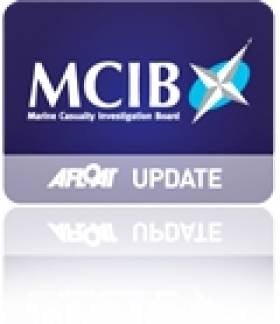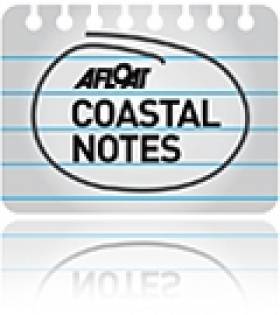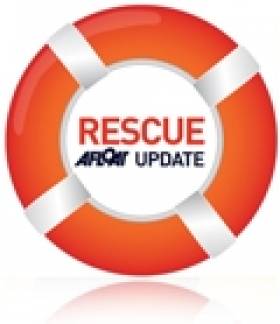Displaying items by tag: Glandore Harbour
#TitBonhomme - The inquest into the Tit Bonhomme tragedy has heard testimony from the sole survivor of the incident that took the lives of five fishermen.
As The Irish Times reports, Abdelbaky Mohamed explained how he and three other crew had been asleep below deck their trawler hit Adam Island at the mouth of Glandore Harbour on the morning of 15 January 2012.
Mohamed said there was no 'big bang' when the vessel hit the rocks but it began taking on water very quickly has he, his brother Wael, Attia Shaban and Kevin Kershaw made their way to the bridge to join Saied Ali Eldin and skipper Michael Hayes.
The boat was rolling in heavy seas as Hayes handed out lifejackets to each crewmen which they then put on, he recalled, adding that conditions made it impossible for them to put on their immersion suits.
The Irish Independent has published a harrowing transcript of the crew's frantic calls to the emergency services as the Tit Bonhomme was assaulted by the waves and eventually capsized.
Mohamed said his lifejacket was ripped from his body by the force of the water crashing into the bridge, but he was able to grab onto it to reach the surface and swim towards the shore, where he was found by a search party two hours later.
Last month's report by the Marine Casualty Investigation Board (MCIB) found that crew fatigue was "the single overriding casual factor" that contributed to the tragedy, pointing out that the crew had less than five hours' sleep during their 40-hour fishing trip.
But Mohamed told the inquest that he had had sufficient rest at the time of the incident.
The Irish Times has more on the story HERE as the inquest continues.
Marine Notices on Vessel Maintenance and Accessibility
#MarineNotice - A recent Marine Notice from the Department of Transport, Tourism and Sport (DTTAS) raises importance of maintenance as highlighted in the MCIB report into the scuttling of fishing vessel Jeanette Roberta in Glandore Harbour in late 2011.
As previously reported on Afloat.ie, the prawn boat was returning to port on 11 December 2011 when the skipper had difficulty switching the helm from auto-pilot to manual due to a known issue with "sticky solenoids". The boat subsequently veered off course without warning and was holed on rocks on Adam's Island.
The official report into the incident castigated the owner/skipper for continuing to sail the vessel with persistent navigation issues - and Marine Notice No 04 of 2013 reminds all fishing vessel operators to ensure that deficiencies with their vessels are rectified without delay.
It is the responsibility of the owner to ensure that a vessel is maintained and operated at all times in accordance with the requirements of the agreed Code of Practice. Owners of all vessels also have a legal obligation to operate their vessels in accordance with the law.
Meanwhile, the latest Marine Notice is directed at passenger vessel owners and operators - encouraging them to continue voluntary efforts to improve accessibility on their vessels.
A new questionnaire has been made available to inform the DTTAS about the extent of accessibility improvements introduced to maritime passenger transport services in the State.
Full details are included in Marine Notice No 05 of 2013, a PDF of which is available to read or download HERE.
Safety Measures Highlighted In Report On Angler's Death
#MCIB - The Marine Casualty Investigation Board (MCIB) has again advised recreational boat users to prioritise safety while on the water following the death of an angler on Lough Corrib earlier this year.
Clarifying the story previously reported on Afloat.ie, Michael Ruane died by drowning after he and angling partner Donal Coyle were knocked overboard from their small craft when it heeled over on a large wave off Annaghdown on 19 March 2012.
Coyle was treated for hypothermia after an unsuccessful attempt to search for his colleague, whose body was recovered by the Irish Coast Guard more than two hours after he entered the water.
The MCIB report into the incident found that the revolving seat used by one of the two men on board meant that "both his height above the gunwale and his position right forward may have had an influence on the handling and stability of the boat", which was not compliant with the EU Recreational Craft Directive.
It also found that while both were wearing personal flotation devices (PFDs), they were only loosely fitting - explaining why Ruane became separated from his lifejacket shortly after going overboard.
Moreover, the kill cord on the boat's engine was not used by either man, which caused them to be separated from their vessel. "The consequence of this," the report said, "was a long period of immersion in cold water which led to the death of one of the men and hypothermia of the other".
There was also a delay of more than an hour in raising the alarm as the men in the water had no means to indicate their distress. Coyle had a mobile phone but it was rendered useless by immersion.
The MCIB has recommended that owners and operators of recreational craft should be aware and follow the Department of Transport, Tourism and Sport’s (DTTAS) Code of Practice for the Safe Operation of Recreational Craft. The complete report is available to download below.
Meanwhile, problems with the auto-pilot system were judged to be the trigger of events that caused the scuttling of fishing vessel Jeannete Roberta in Glandore Harbour last December.
The prawn boat was returning to port on 11 December 2011 when the skipper had difficulty switching the helm from auto-pilot to manual due to a known issue with "sticky solenoids".
While the skipper addressed that issue, the boat suddenly altered course without warning - another issue known to occur randomly - and was holed on rocks on the southern side of Adam's Island before eventually sinking.
While castigating the owner/skipper for continuing to sail the vessel with persistent navigation issues, the MCIB also noted that all six crew survived the incident uninjured, finding that all stayed calm and organised as they abandoned ship, and that all safety and communications equipment functioned as required.
Body of Final Tit Bonhomme Crewmember Recovered
#NEWS UPDATE - The body of the last missing crewmember of the stricken Tit Bonhomme was recovered in Glandore Bay in West Cork on Friday, The Irish Times reports.
The remains of 23-year-old Egyptian national Saied Ali Edlin were discovered floating on the surface to the west of the bay off Long Point, almost a mile from the wreck site and close to a month after the tragedy occurred.
It also comes just two days after the body of skipper Michael Hayes was found close to the mouth of the harbour, as previously reported on Afloat.ie.
The fishing vessel Tit Bonhomme ran aground in rough seas near Adam's Rock, at the mouth of Glandore Harbour, on Sunday 15 January.
Five of the six-person crew - Eldin, Hayes, Attea Shaban (26), Kevin Kershaw (21) and Wael Mohammed (35) - lost their lives when the boat went down.
Only 43-year-old Abdul Mohammed, the brother of Wael Mohammed, survived the sinking after he was able to reach the shore.
"Some of those lost were Egyptian, some were Irish but if you fish the sea, you’re all part of the same family," commented harbour master John Minihane. "We’re all the same, we’re one fishing family and we brought them home.”
The Irish Times has more on the story HERE.
Body of Tit Bonhomme Skipper Recovered
#NEWS UPDATE - RTÉ News reports that a body found in Glandore Harbour today is that of Tit Bonhomme skipper Michael Hayes.
The body of the 52-year-old from Helvick Head in Co Waterford, who went missing more than three weeks ago, was discovered floating close to the mouth of the harbour around lunchtime by his brother, Garda Chief Spt Tom Hayes, according to The Irish Times.
As previously reported on Afloat.ie, the search operation in Glandore is being wound down this week after the remains of three of the five missing crew were recovered. Egyptian crewman Said Mohammed (23) - also known as Saied Ali Eldin - is still missing.
The fishing vessel Tit Bonhomme ran aground and went down in rough seas near Adam's Rock, at the mouth of Glandore Harbour, on Sunday 15 January.
Only one crewmember, 43-year-old Abdul Mohammed, is confirmed alive after he was able to reach the shore.
Search for Glandore Fishermen to be Wound Down
#NEWS UPDATE - The search for two fishermen still missing after their boat went down off West Cork nearly three weeks ago will be wound down next week, The Irish Times reports.
Search teams have been combing the area for any trace of Michael Hayes (35), skipper of the Tit Bonhomme, and crewman Said Mohammed (23) after the fishing vessel ran aground in rough seas near Adam's Rock, at the mouth of Glandore Harbour, on Sunday 15 January.
The bodies of Kevin Kershaw (21), Attia Shaban (26) and Wael Mohammed (35) were recovered in the days and weeks following the tragedy. Only one of the six-person crew - 43-year-old Abdul Mohammed – is confirmed to have survived.
As previously reported on Afloat.ie, last weekend saw more than 90 divers embark on an extensive search of the wreck site and the Glandore bay area, with hundreds more volunteers searching the coastline and on land.
Coastguard 'Overwhelmed' By Response to Glandore Search Appeal
#NEWS UPDATE - The Irish Coast Guard told RTÉ News that it has received an "overwhelming" response from the diving community to its appeal to join the search in West Cork for two missing fishermen.
Skipper Michael Hayes and crewman Saied Ali Eldin are still missing after the fishing vessel Tit Bonhomme ran aground in rough seas near Adam's Rock at the mouth of Glandore Harbour.
Only one of the six-person crew - 43-year-old Abdul Mohammed – is confirmed to have survived. The bodies of Kevin Kershaw (21) and Attia Shaban (26) were recovered last week, while the remains of Wael Mohammed (35) were found by civilian divers near the wreck site last Sunday.
Coastguard manager Declan Geoghegan said that search teams now have the 48 divers required to conduct an exhaustive search of the wreck area and urged further volunteers not to travel for the moment.
The search will concentrate on the waters between Adam's Rock and Long Point, where much of the debris from the trawler has washed up.
RTÉ News reports that more than 200 volunteers are assisting the coastal search by boat and on land, which is being co-ordinated from the village of Union Hall.
Screening Shown of Unique Lives Lost at Sea Ceremony
#MARINERS WITH MEMORIES – At the weekend representatives of the maritime community, relatives and visitors alike attended a screening of the 'Mariners with Memories' ceremony, which was shown in the Maritime Museum, Dun Laoghaire.
The ceremony which took place in Bray Harbour last July, is unique in that it recognises to all those lost to sea throughout the world and especially to those whose grave is the sea.
Shot by Colm Fynes, the film documented the day's proceedings with tributes made at the Co. Wicklow harbour and the flotilla that followed with floral tributes carried out close to the shore.
Captain Tony O'Grady who organised the Mariners with Memories ceremony, thanked all those to the museum and the support of the Maritime Institute of Ireland, whose newly renovated museum was a particularly apt venue, being the former Mariners Church.
Some of the relatives who attended the memorial event in Bray were also at the Dun Laoghaire screening and where they gave moving tributes to loved ones.
Commenting on the poignancy of the screening, Captain O'Grady referred to the on-going tragic events in Glandore Harbour and off the Italian island of Giglio.
He added that those involved in the various services off the West Cork fishing harbour would of liked to have attended but given the circumstances, all the resources were required at the scene.
It is hoped that following the inaugural ceremony, that Mariners with Memories will become an annually held event and the close relationship with the museum continues.
The museum which was especially opened for the screening will remain closed throughout the winter months though is open on an invitation only basis. Officially the museum is due to re-open this Easter, to keep posted of further developments visit www.mariner.ie
Search Continues for Three Fishermen Still Missing in West Cork
#NEWS UPDATE - The search is set to resume again this morning for the three fishermen not yet recovered after their trawler sank off West Cork last Sunday.
Skipper Michael Hayes and Egyptian crewmen Saied Ali Eldin and Wael Mohammed have been missing since the fishing vessel Tit Bonhomme ran aground and went down in rough seas near Adam's Rock, at the mouth of Glandore Harbour.
Only one of the six-person crew, 43-year-old Abdul Mohammed, is confirmed alive after he was able to reach the shore immediately following the incident.
As previously reported on Afloat.ie, Garda divers retrieved the body of Attia Shaban (26) on Thursday morning, followed in the afternoon by that of Kevin Kershaw (21).
Yesterday the search was expanded to cover an 18-mile radius after a dive at the wreck site was unsuccessful, according to The Irish Times.
Divers from the Garda and Naval Service will continue to focus on the wreck today, helped by favourable weather conditions, while volunteers join in the wider search of the coastline.
It emerged on Friday that that boat's aluminium wheelhouse sheared off in the rough seas that followed for three days after it ran aground.
RTÉ News has video of the search operation in progress HERE.
Body Recovered as Search for West Cork Fishermen Continues
#RESCUE - Garda divers have this morning recovered a body in their search for the crew of the fishing vessel Tit Bonhomme off the coast of West Cork.
As previously reported on Afloat.ie, five of the six-person crew went missing after the boat ran aground and went down rough seas near Adam's Rock, at the mouth of Glandore Harbour.
The five men include skipper Michael Hayes from Helvic Head in Co Waterford, Dubliner Kevin Kershaw (21) and Egyptians Said Mohammed (23), Wael Mohammed (35) and Attea Ahmed Shaban (26).
RTÉ News reports that the body recovered this morning has not been identified, but it is believed to be that of an Egyptian national.
Dive teams from the Garda and Naval Service have been set back by the trawler's position wedged in a narrow inlet with strong wash and backwash on either side, but were said to have made "significant progress" during dives yesterday.
A broader search is also being conducted inside and outside the harbour area and surrounding coastline, assisted by fishing boats, Irish Coast Guard rescue helicopters, and small boats and kayaks.







































































